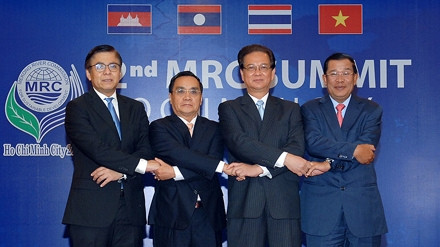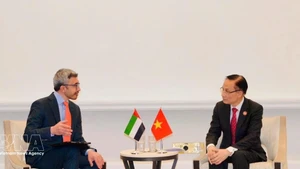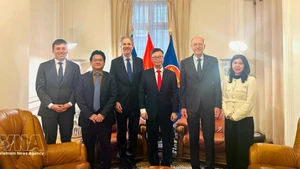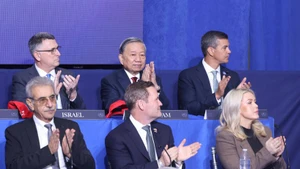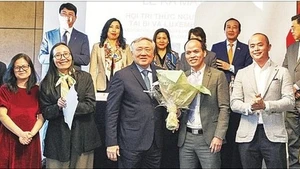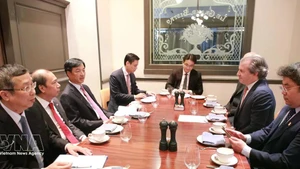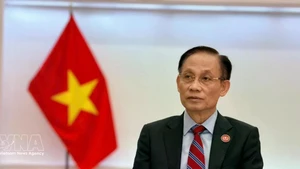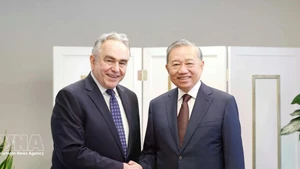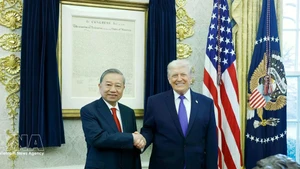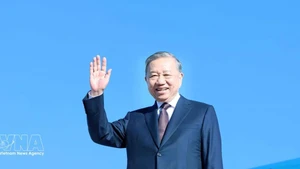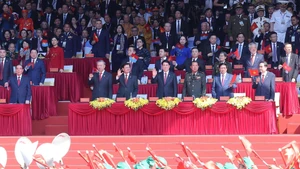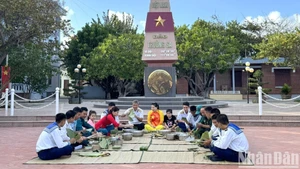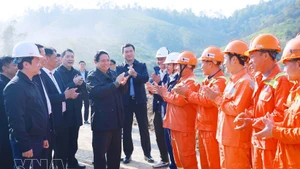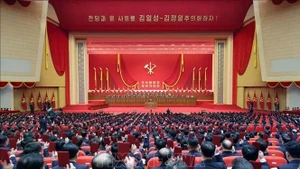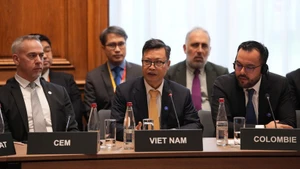Following is the full text of the declaration:
“Ho Chi Minh City Declaration
Water, Energy and Food security in the context of climate change for the Mekong River Basin
5 April 2014
Preamble
We, the Heads of the Governments of the Kingdom of Cambodia, the Lao People’s Democratic Republic, the Kingdom of Thailand, and the Socialist Republic of Vietnam, meet in Ho Chi Minh City, Vietnam, for the Second Summit of the Mekong River Commission (MRC).
We reaffirm the vital importance of sustainable use and management of water and related resources of the Mekong River Basin and the continuing political commitment to implement the 1995 Mekong Agreement, and consolidate the spirit of Mekong co-operation;
We note that the development of water resources of the Mekong River Basin has contributed largely to the socio-economic development of the region, such as for navigation, energy and food production, but also has negative environmental and social impacts in the Basin that need to be fully and effectively addressed;
We recognise that climate change is a global issue, which has impacted the livelihoods and economy in all parts of the Mekong River Basin. Mitigation of and adaptation to climate change is crucial and needs to be urgently addressed;
We recall the First MRC Summit’s priority actions and commitments, including adopting and implementing the MRC IWRM-based Basin Development Strategy, the MRC Strategic Plan 2011 – 2015, and identifying opportunities and risks of hydropower, irrigation, fisheries, navigation, flood and drought management, watershed management, tourism and environment including ecosystem management in the Basin to food security and livelihoods;
We re-affirm our strong and continued commitment to co-operating and promoting the sustainable development of the Mekong River Basin , and in the utilisation, conservation and management of its water and related resources, and agree to the following statements:
Achievements since the First MRC Summit
We, the Heads of Governments, recognise the progress and achievements over the last four years since the First MRC Summit.
Since the adoption of the MRC IWRM-based Basin Development Strategy in 2011, we note with appreciation that the MRC Member Countries and Secretariat have made significant efforts to develop Regional and National Action Plans for implementing the Strategy, which is supplementing Member Countries’ social and economic development plans.
We acknowledge the expanded implementation of the Procedures for Notification, Prior Consultation and Agreement (PNPCA) to support sound decision-making on proposed water resources development projects in the Mekong River Basin.
We are pleased to note that approval of the Procedures for Water Quality in early 2011 completes the full set of MRC Water Utilisation Procedures, which provide a procedural and technical framework to assist MRC Member Countries in the sustainable use of water and related resources of the Mekong River Basin.
We note the importance and usefulness of continuing exchange of data and information amongst Member Countries under the Procedures of Data and Information Exchange and Sharing (PDIES), and we highly appreciate enhanced co-operation with the MRC Dialogue Partners, namely People’s Republic of China and Republic of the Union of Myanmar.
We recognise the progress achieved in the riparianisation of the MRCS with the successful launch of the MRC Junior Riparian Professional Programme and increased numbers of riparian staff and national experts working for the MRCS.
With a vision for the MRC to be financially sustained by Member Countries by 2030, we acknowledge with appreciation the preparations undertaken by the MRC for decentralised implementation of its core river basin management functions outlined in one regional and four national roadmaps, including priorities and milestones.
We are grateful for the increased financial and technical support from Development Partners that will sustain MRC programmes beyond 2015, and prepare for self-financing by 2030.
We also note that the MRC has established a working relationship with the ASEAN and the Mississippi River Commission and explored synergies with other regional and international co-operation to further promote the sustainable development and management of the Mekong Basin’s water resources.
We acknowledge with appreciation the outcomes of Mekong 2 Rio: International Conference on Trans-boundary River Basin Management held on May 1-3, 2012 in Phuket, Thailand, and the International Conference on Co-operation for Water, Energy and Food Security in Trans-boundary Basin under Changing Climate held on the 2-3 April 2014 in Ho Chi Minh City, Vietnam, which provided an excellent opportunity to share and learn from global experiences in trans-boundary water development and management.
Regional opportunities and challenges
We, the Heads of Governments, acknowledge that the MRC faces both opportunities and challenges over the next decade.
Increasing development pressures such as population growth and economic expansion create huge demand for water, food and energy, placing a burden on the Mekong River Basin resources. At the same time the global economic crises have reduced the availability of investment and funding for MRC programmes. Assuring water security, and thereby removing imminent and increasing risks to food and energy security, economic growth and stability, is a daunting challenge the region now faces.
In continuing efforts to mitigate natural disasters, recognising climate change will continue to alter the hydrological regime of the Basin impacting livelihoods and economies in all parts of the Basin.
The importance of strengthened co-operation for the sustainable development of the Mekong River Basin is acknowledged. New co-operation opportunities with other regional and international initiatives will be explored; funding and technical support from new development partners will be sought, to help sustain and ensure MRC can continue its important work.
Priority areas of action
We, the Heads of Governments, expect the MRC to focus on and prioritise:
i. Expediting the implementation of the MRC Council’s Study on Sustainable Management and Development of the Mekong River, including the impacts of mainstream hydropower projects, in co-ordination with the Mekong Delta Study initiated by Vietnam to provide sound advice and recommendations on sustainable development in the Basin;
ii. Reviewing, updating and implementing the IWRM-based Basin Development Strategy and implementing the MRC Strategic Plan 2011-2015, preparing and implementing the Strategic Plan 2016-2020 to help shape current and future development in the Basin ;
iii. Avoiding, reducing and mitigating risks to river ecology, food security, livelihoods and water quality posed by intensive agriculture, aquaculture, and irrigation, as well as hydropower, navigation and other development activities in the Basin, recognising that the impacts of climate change could compound these risks;
iv. Continuing to improve the implementation of the MRC Procedures to support the implementation of the 1995 Mekong Agreement; committing to the effective implementation of the MRC Procedures to realise its goals;
v. Exploring and identifying opportunities to expand co-operation between the MRC Dialogue Partners, current and new Development Partners and other regional and international initiatives;
vi. Furthering the efforts in basin wide disaster risk reduction for floods, droughts and impact of sea level rise; monitoring and taking measures to maintain good water quality in the Mekong River Basin;
Way ahead
We, the Heads of Governments, reaffirm our solidarity and the highest level of political commitment to the implementation of the 1995 Mekong Agreement;
We commit to working together to strengthen the role of the MRC in ensuring the application of an integrated water resources management approach to ensure the sustainable use and conservation of water, food, and energy resources in the Region;
We reiterate our support for enhancing and strengthening the MRC’s working relationships and co-operation with Dialogue Partners, Development Partners, international and regional initiatives, civil society, the private sector and others; and call upon their support and assistance to the MRC and its individual Member Countries in implementing projects and studies on sustainable development in the Mekong River Basin;
We also express our support to the MRC to continue making preparations to decentralise MRC core river basin management functions, paving the road for the organisation to be fully self-financed by 2030;
We emphasise the needs to prioritise capacity building for the Member Countries;
We agree to task the MRC Council to ensure the effective implementation of this Declaration through practical programmes and projects.
We express our sincere appreciation to Vietnam for hosting the Second MRC Summit, and we look forward to the third MRC Summit to be held in April 2018 in Cambodia.
ADOPTED at Ho Chi Minh City, Vietnam on 5 April 2014 in the English Language”
